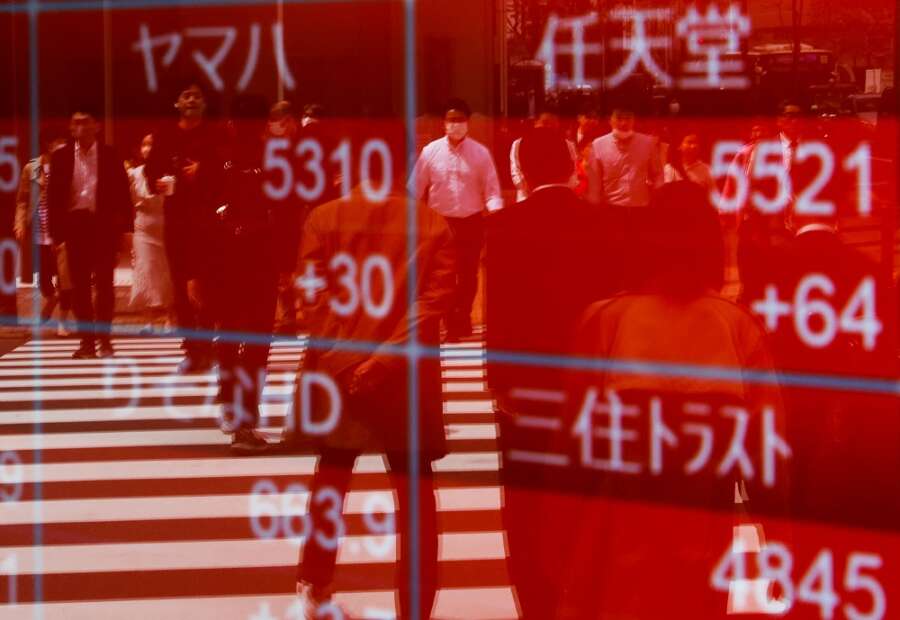
Concern over US default risk grips global markets as talks resume
By Chris Prentice and Nell Mackenzie
NEW YORK/LONDON (Reuters) -Unease over how U.S. debt ceiling negotiations will pan out gripped global markets on Monday, with equities mixed and U.S. treasury yields modestly higher.
Oil futures were higher as demand optimism offset the default concerns. Gold prices retreated following hawkish comments from a Federal Reserve official.
U.S. President Joe Biden and House Republican Speaker Kevin McCarthy will meet to discuss the debt ceiling on Monday, less than two weeks before a June 1 deadline after which Treasury expects the federal government will struggle to pay its debts.
A failure to lift the debt ceiling would trigger a default, likely sparking chaos in financial markets and a spike in interest rates.
“We expect a resolution to be reached before the deadline, but anticipate unforeseen developments throughout the process,” said Bruno Schneller, a managing director at INVICO Asset Management.
Broader economic indicators in multiple countries indicate a slowdown, he said.
The MSCI world equity index, which tracks shares in 49 nations, gained 0.2% by 10:22 a.m. EDT (1422 GMT).
The Dow Jones Industrial Average fell 102.69 points, or 0.31%, to 33,324.12, the gained 3.14 points, or 0.07%, to 4,195.12 and the gained 51.51 points, or 0.41%, to 12,709.41.
Europe’s STOXX 600 index fell 1.39%, while Europe’s broad FTSEurofirst 300 index retreated 0.13%.
Jonathan Pingle, U.S. chief economist at UBS, said the Japanese yen and gold were best placed to benefit from any U.S. default.
“Only a one-month long impasse post the X-date is likely to cause a tightening of financing conditions sharp enough that it causes the dollar to rally strongly,” said Pingle.
CHIP BAN
Asian share rose after China on Sunday barred U.S. firm Micron from selling memory chips to key domestic industries over security concerns.
The ban helped stocks of Micron’s rivals in China and elsewhere, which are likely to benefit as mainland companies seek memory products from other sources.
However, market jitters about the U.S. debt ceiling remained pervasive.
On Friday, as negotiations reached an impasse, Federal Reserve Chairman Jerome Powell said rates might not need to rise as much given the tighter credit conditions from the banking crisis.
On Monday, Minneapolis Federal Reserve President Neel Kashkari said it was a “close call” whether he would vote to raise interest rates or pause the central bank’s tightening cycle when it meets next month.
Gold prices fell 0.35% to $1,969.70 an ounce.
Futures are pricing in close to a 90% chance that the Fed will keep rates unchanged at its next meeting in June, and a total of almost 50 basis points of cuts by the end of the year.
The yield on benchmark 10-year Treasury notes traded at 3.6976% compared with Friday’s close of 3.692%. The two-year yield, which rises with traders’ expectations of higher Fed fund rates, touched 4.3048% compared with previous close of 4.289%.
The dollar index, which tracks it against a basket of major currencies, was up at 103.25, but still off last week’s two-month high.
The euro was flat against the dollar at $1.0808.
In Asis, China kept its key lending rates unchanged on Monday even as an economic recovery disappointed. Traders were also digesting the implications of the Group of Seven’s “de-risk, not decouple” approach to China and supply chains that the group flagged at its summit.
MSCI’s broadest index of Asia-Pacific shares outside Japan were up 0.6%.
U.S. crude ticked up 0.28% to $71.75 a barrel. Brent crude rose to $75.67 per barrel.
The Fed will release minutes of its May meeting on Wednesday. U.S. personal consumption expenditure inflation data is expected on Friday.
(Reporting by Chris Prentice, Nell Mackenzie, Stella Qiu and Rae Wee; Graphics by Kripa Jayaram and Lewis Krauskopf; Editing by Sam Holmes, Muralikumar Anantharaman and Jane Merriman)


